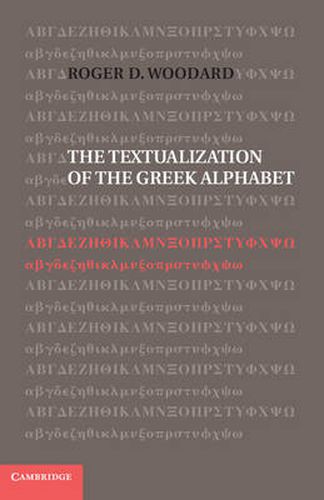Readings Newsletter
Become a Readings Member to make your shopping experience even easier.
Sign in or sign up for free!
You’re not far away from qualifying for FREE standard shipping within Australia
You’ve qualified for FREE standard shipping within Australia
The cart is loading…






In this book, Roger D. Woodard argues that when the Greeks first began to use the alphabet, they viewed themselves as participants in a performance phenomenon conceptually modeled on the performances of the oral poets. Since a time older than Greek antiquity, the oral poets of Indo-European tradition had been called ‘weavers of words’ - their extemporaneous performance of poetry was ‘word weaving’. With the arrival of the new technology of the alphabet and the onset of Greek literacy, the very act of producing written symbols was interpreted as a comparable performance activity, albeit one in which almost everyone could participate, not only the select few. It was this new conceptualization of and participation in performance activity by the masses that eventually, or perhaps quickly, resulted in the demise of oral composition in performance in Greece. In conjunction with this investigation, Woodard analyzes a set of copper plaques inscribed with repeated alphabetic series and a line of what he interprets to be text, which attests to this archaic Greek conceptualization of the performance of symbol crafting.
$9.00 standard shipping within Australia
FREE standard shipping within Australia for orders over $100.00
Express & International shipping calculated at checkout
In this book, Roger D. Woodard argues that when the Greeks first began to use the alphabet, they viewed themselves as participants in a performance phenomenon conceptually modeled on the performances of the oral poets. Since a time older than Greek antiquity, the oral poets of Indo-European tradition had been called ‘weavers of words’ - their extemporaneous performance of poetry was ‘word weaving’. With the arrival of the new technology of the alphabet and the onset of Greek literacy, the very act of producing written symbols was interpreted as a comparable performance activity, albeit one in which almost everyone could participate, not only the select few. It was this new conceptualization of and participation in performance activity by the masses that eventually, or perhaps quickly, resulted in the demise of oral composition in performance in Greece. In conjunction with this investigation, Woodard analyzes a set of copper plaques inscribed with repeated alphabetic series and a line of what he interprets to be text, which attests to this archaic Greek conceptualization of the performance of symbol crafting.